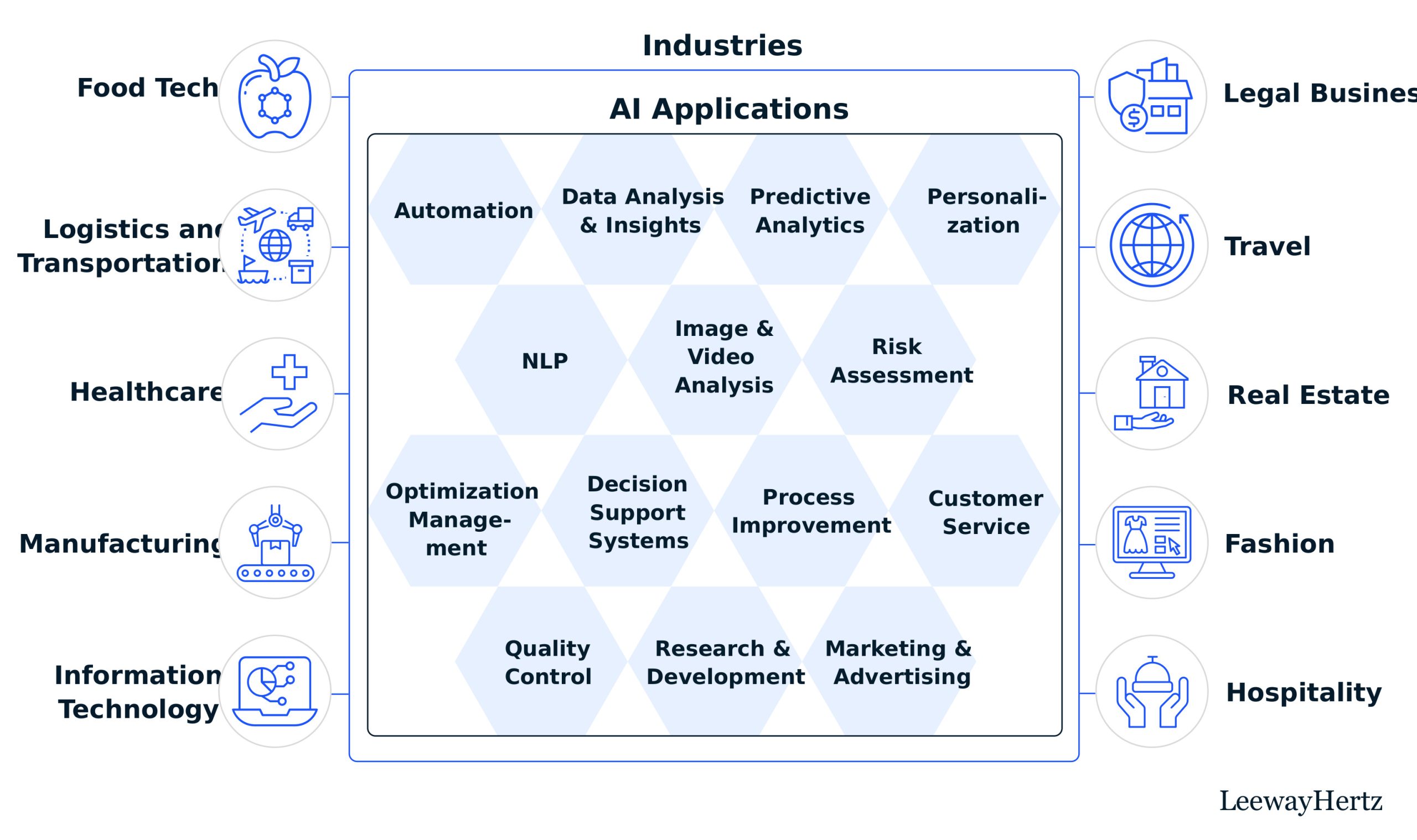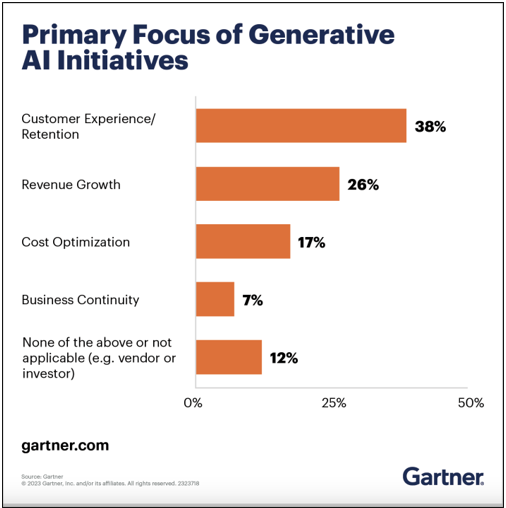
Empower your business: Unlock Growth with AI In India
90% of small businesses in India are harnessing the potential of artificial intelligence (AI) and automation to combat uncertainty and challenges. Today, “AI” has become more than a trending word, and its potential benefits are vast and varied.
According to a report by Grand View Research, the global AI market is forecasted to increase at a CAGR of 37.3% from the year 2023 to 2030.

From improving efficiency to enhancing customer experiences and driving revenue growth, it has become a fundamental part of modern business strategies.
In this blog, we are going to explore the transformative power of AI for small businesses in India. We want to show you how AI can help the businesses grow and stay competitive in the dynamic Indian market.
Let’s begin!
Understanding AI for Small Businesses
What is AI?
At its core, Artificial Intelligence or AI refers to the capability of machines to simulate human intelligence, behaviors and even emotions. It analyzes:
- Large amounts of data and make decisions using data inputs
- Automate repetitive tasks
- Interpret visual information
- Make predictions or recommendations based on patterns.
In simple terms, AI is software that is programmed to “think” intelligently. Have you ever used Amazon’s Alexa? If yes, then you have interacted with AI.
Applications in various industries
Now, its usage is rapidly growing across various industries to
- Analyze data
- Automate tasks
- Optimize supply chains
- Offer personalized customer experiences
- Enhance decision-making and more!
Below are some of the applications of AI or use cases in some major industries.
- Agriculture
Many of you might be surprised to see this name on the top of the list. But yes, it’s true that the agriculture industry is using AI. Here’s how!
Farmers utilizing its power to:
- Analyze weather patterns to anticipate forecasts and plan planting schedules effectively.
- Determine the most suitable crops to cultivate based on various factors.
- Combat pest infestations by detecting and addressing them early on.
- Measure soil conductivity and pH levels for optimized crop growth.
Also, the integration of AI with robotics has proved to be a game changer. It enables farmers to harvest crops much faster and more efficiently than traditional human labor methods.
- Healthcare
Artificial Intelligence (AI) is changing the dynamics of healthcare industry.
- It allows doctors to diagnose diseases faster from X-rays and other scans.
- Create personalized or customized treatment plans based on the individual’s unique medical history and genes.
- Optimizes healthcare operations by automating administrative tasks, scheduling appointments, and managing electronic health records.
- E-commerce
The e-commerce industry has capitalized on AI in the following ways.
- It enhances customer’s shopping experience by suggesting products according to their browsing and purchase history.
- AI chatbots provide instant customer support and resolve customer queries 24*7.
- Optimizes inventory management and pricing strategies by analyzing market trends and demand patterns.
- Banking and financial services
If every other industry is using the power of AI, how will the finance industry be left behind? Here are some of the use cases.
- Helps in spotting and stopping fraudulent activities in banking and finance. By inspecting how people usually spend money, it can quickly identify any unusual or suspicious transactions.
- Banks can analyze a wide range of information about an individual or business to determine whether they are reliable enough to lend money.
- By assessing market trends and data, AI algorithms can make wise or informed decisions about buying and selling stocks.
- Supply chain & logistics
Artificial Intelligence (AI) is revolutionizing supply chain and logistics operations in various ways.
- Analyze historical data and market trends to analyze future demand for products accurately.
- AI-powered route optimization software optimizes delivery routes based on factors such as traffic or weather conditions and delivery constraints.
- Provide real-time visibility into the entire supply chain and allow companies to track shipments, monitor inventory levels, and identify potential disruptions beforehand.
- Education
While this sector still requires human intervention, AI is boosting the potential of educators.
- AI-driven tutoring systems offer personalized guidance and feedback to students so they can improve their academic scores.
- Manage multiple online courses at once and digitize lectures and study guides.
- AI-powered virtual assistants solve students’ queries and assist with other tasks.

Benefits of AI for Small Businesses
● Improved Efficiency
87% of businesses believe that AI will help them improve operational efficiency and grow revenue. Read on to find out how!
A plethora of repetitive tasks, such as data entry, invoicing, and inventory management, can be automated through AI for small businesses. This allows employees to do more strategic and value-added tasks.
It also optimizes workflows by analyzing processes and identifying bottlenecks or inefficiencies. This automation and optimization increase productivity and reduce unnecessary manual interventions.
● Enhanced Customer Experience
As the graph below clearly shows, Generative AI’s primary focus is improving customer experience. And why not? It’s because of customers by which a business becomes successful. Isn’t it?

● AI helps small businesses
to analyze customer data, preferences, and behaviour to personalize products and services. By understanding customer needs and requirements, businesses can customize offerings, recommendations, and marketing messages, leading to higher customer satisfaction and increased sales.
AI-powered chatbots and virtual assistants provide immediate and personalized customer support 24*7. Also, these can answer customer queries, provide product information, assist with order tracking, and improve overall customer service quality.
● Competitive Edge
AI helps small businesses to make informed decisions based on data analysis and insights. By leveraging AI to analyze large datasets, they can identify trends, customer preferences, and market opportunities. This way, the entrepreneurs can make choices that are more likely to succeed and keep them competitive.
It’s obvious that the market and consumer preferences evolve over time. By using AI to understand what’s happening in real-time, businesses can adjust their products and strategies to stay ahead of competitors and effectively meet customer needs.
AI Applications for Small Businesses in India
There are various use cases of AI for small businesses, as explained below.
● Marketing and Sales
Content is always king, but at the same time, engagement is the queen, and both are incomplete without each other.
Today, when Artificial Intelligence is everywhere, marketing has become more than a buzzword because customer expectations are continuously increasing. They want everything to be personalized.
AI-powered marketing enables small businesses to target specific user segments that are more likely to become their customers. By analyzing how people behave online, AI can show ads to the right people at the right time, making marketing efforts more effective and efficient. It will be a win-win situation for all.
To forecast future sales and identify potential leads, AI algorithms analyze historical sales data and the latest trends. This predictive analytics capability allows small businesses to:
- Anticipate demand,
- Allocate resources efficiently and
- Focus efforts on high-potential leads to drive sales growth and revenue.
● Customer Service
We have already explained the importance of customer service for a business, but now we will tell you how AI can help you improve it.
AI can analyze large volumes of consumer data to:
- Find their buying patterns,
- Preferences and
- Problems that they frequently encounter.
All the above aspects can be used to provide better customer service and customize offerings, resulting in meaningful, loyal, and profitable relationships.
Small businesses can use AI chatbots to help customers with common questions and issues. These chatbots can provide instant responses and are so sophisticated that users cannot tell whether they are talking with an AI or a human.
AI tools can look at customer reviews and comments to understand how customers feel about the business. This helps businesses see what they’re doing well and where they can improve their services based on customer feedback.
● Financial Management
Small businesses can use AI to automate repetitive accounting tasks like entering data, processing invoices, and balancing accounts. This makes financial paperwork faster and more accurate, ensuring that financial reports are reliable and up-to-date.
According to a report by the Cambridge Centre of Alternative Finance, 85% of financial services providers are using AI. With such big numbers, fraud detection and risk management are vital. So, artificial intelligence can analyze financial transactions to spot unusual patterns that might indicate fraud.
Ultimately, it helps small businesses to protect themselves from financial scams and identify potential risks to their finances.
● Operations and Logistics
AI-driven logistics and supply chain management help small businesses predict the demand for their products. This helps them plan ahead and ensure they have enough inventory to cater to customer needs without overstocking or running out of stock, resulting in seamless supply chain operations.
AI-powered predictive analytics can analyze data to anticipate inventory needs and optimize logistics operations. This means businesses can better manage inventory levels, decrease storage costs, and ensure timely deliveries to customers.
Challenges and Considerations for AI Adoption
The transition of AI for small businesses brings a myriad of challenges, as detailed below.
● Data Privacy and Security
As mentioned above, AI analyzes vast amounts of data for accurate predictions. This, in turn, becomes a challenge for AI adoption. Here’s how
The data used by AI often includes sensitive information, such as names, addresses, passwords, etc. If so many details are being collected and processed, improper handling or unauthorized access will result in privacy breaches and violations of an individual’s rights to privacy.
So, small businesses must ensure that AI implementations adhere to regulations, like GDPR or HIPAA to protect customer and business data. Also, they must invest in cybersecurity measures such as,
- Access controls
- Encryption, &
- Regular security audits to secure sensitive information and prevent data breaches.
● Integration with Existing Systems
The integration of AI into existing systems can be complex. Why?
Legacy technologies may include outdated software, networks, or hardware that lack the necessary capabilities to analyze vast amounts of data. Differences in data formats and communication protocols will present significant hurdles. Compatibility issues can also arise during data transfers and real-time processing.
For solving all of these concerns, small businesses must assess compatibility issues and consider customization or migration strategies.
To use AI at its full potential, you must identify the problem that you want to solve. Failure to do so can become a major problem in the long run.
● Cost and Resources
Getting started with AI can be expensive, especially for small businesses, as it involves buying new technology and setting up different systems. In addition, employees need to learn how to use AI effectively. This may involve additional training costs to ensure everyone is comfortable and skilled with the new technology.
Overall, to harness the full potential, you must address all the above barriers.
Best Practices for Implementing AI in Small Businesses
Implementing AI in a small business can be approached by the below best practices.
● Start with Clear Objectives
Your successful AI implementation journey will only start with a clear vision and an end goal.
Start by defining clear objectives. Ask yourself why you want to adopt AI, whether it’s to optimize processes, enhance customer experience, or improve any other specific metrics.
By having a clear understanding of the goals, you can determine which AI tools and technologies are the best suited for your business.
● Pilot Projects and Testing
Never invest all your savings and investments in one go for a project. Instead, start by trying out AI on a small scale to see how well it works for your business.
Choose specific areas or tasks where AI can be applied, such as customer service or inventory management. This allows you to test the effectiveness of AI in real-world scenarios before committing to larger implementations.
Now, you have to collect feedback from employees and customers who interact with the initial solution. Pay attention to their experiences, suggestions, and any issues they encounter
Use this feedback further to improve or refine your AI solutions and make adjustments to better meet user needs.
● Continuous Learning and Improvement
Continuous monitoring and improvement are key to a successful venture. Establish clear KPIs (key performance indicators) to assess your AI system’s effectiveness.
Create an supporting environment where employees feel comfortable experimenting with different tools. Encourage them to think creatively and explore different ways AI can help solve problems or make tasks easier.
Trends in technologies change every single day. So, keep up with what’s new in AI. Attend events or read articles to understand how AI is evolving and how it could benefit your business in the future.
To get a better Return On Investment (ROI), always be ready to revise, refine, change, and set new KPIs.
Success Stories and Case Studies
Below are some of the successful small businesses in India that have successfully leveraged AI for growth and innovation.
● Staqu
Staqu, an AI startup based in Gurugram, developed “JARVIS,” a facial recognition and video analytics software that transforms long CCTV video footage into meaningful information. The brand’s AI-powered solutions have enhanced the efficiency and effectiveness of law enforcement operations.
From retail and manufacturing to healthcare and the public sector, all major industries are harnessing the power of “JARVIS.”
Further, the startup has gained numerous accolades and partnered with state police departments and other law enforcement agencies to identify suspects, solve criminal cases, and improve public safety.
● Niramai
Nirami is an artificial intelligence-based medical device that discovers breast cancer at an earlier stage than traditional methods or self-examination. Their Thermalytix uses AI to analyze thermal images and identify potential signs of breast cancer, which is especially helpful for women in remote areas.
Niramai Quality Management Processes are certified with ISO 13485 and MDSAP and are used by more than 100,000 women in 150+ hospitals and diagnostic centres.
● Cure.fit
Cure.fit or Cult.fit uses AI to help people with their health and fitness goals. It creates personalized workout plans and suggests diets based on each person’s needs and preferences.
● CropIn
CropIn, a startup based in Bangalore, has significantly improved farming by using AI and data analysis. They offer a complete farm management system that uses satellite images, AI technology, and data analysis to give farmers real-time information and practical advice.
CropIn’s AI platform helps farmers grow crops better, reduce losses, and handle risks smarter.
Conclusion
AI for small businesses has the power to make operations smoother, improve how customers are served and help brands grow in competitive markets. Take the necessary steps to understand how it works and how it might improve and increase your organization’s efficiency. But at the same time, be ready for the potential risks as well.
Also, it’s important to stay updated on AI trends because the business world is changing fast. By keeping up with AI, you can make smarter decisions.
If you found this blog helpful, share it with other small business owners you know!















